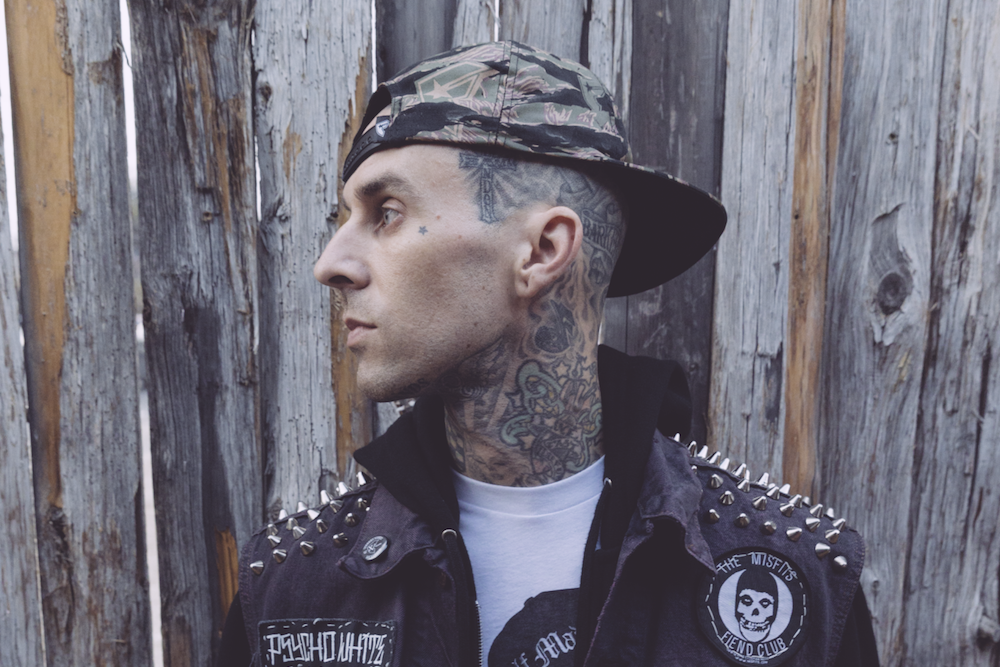International multi-genre crossovers are the norm in today’s radio rotation. Kids smash Soundcloud rappers, ’70s rock bands and Dutch house megastars onto personal playlists stitched together by a common energetic thread, but when Travis Barker was 14, that kind of behavior wasn’t as common.
“I was happily confused,” the musician says. “I never wanted to listen to one style of music. To me, it was like eating the same meal every day or wearing the same clothes.”
Barker is well known as the drummer of Blink-182, but he’s extended his influence with studio and stage collaborations with Method Man, Machine Gun Kelly, UGK, Halsey and many more. He’s moved beyond his punk rock roots to showcase skills as a beatmaker and producer. In a video that online sound library Splice and the drummer are sharing first with SPIN, Barker opens up about his expansive career and how his drum kit sample pack might inspire other musicians.
SPIN also caught up with Barker to chat about how one curates such an offering, as well as his recent work with Lil Nas X and Trippie Redd, what he’s learned from watching Pharrell, and why 2019 is a great year for artists who dare to dream.
How did the Splice sound pack come about?
I was using Splice a lot with the different production I’ve been doing, mostly some of the rap music I produce. It’s always been my supermarket for sounds when I’m looking for something or maybe I’ve hit a creative block and need something to start with.
I’d done a sound pack a while back with LOUDPVCK’s Kenny Beats. That was really fun, so when the idea came up to do it with Splice, and I said I’d love to. I just happened to be working on $uicideboy$ EP. I was recording the Blink album. I was finishing up my project with 03 Greedo, and I was just inspired. I was already in the studio 24/7.
Some of my Splice pack includes actual recordings from the Blink album, or different projects that I was producing. Some of it I just put on a click at 130 bpm, played to it and came up with some interesting loops and drum fills. There’s a lot of my go-to sounds in there as well.
How do you go about the curation?
I think there was even more to begin with, and then I went through and listened to stuff like, “That’s cool. That’s not going to make it.” Towards the end, I was recording more and more stuff, sending things I did last night. It came to a point where I had to tell myself stop. It could keep going on forever.
Sharing is everything, really. In this day and age, I could share all of my sounds to the world, and everyone’s brain is different, so no one is going to recreate something I did verbatim. Maybe it’ll inspire or influence someone to do something that I never thought of or just doesn’t exist. It’s a way to give back and contribute to [the community] since I do take from there, whether it’s a one shot or a loop that may inspire me to do a percussive loop the same way. And I noticed there was kind of a void of stuff like I was doing.
Does your brain work differently when you’re trying to come up with a loop as a producer rather than a drummer in a band?
With rap music, I can come up with an idea and have a finished song mixed and mastered within two hours. With a band, I’m sitting there and a bass player is playing the bass part, the guitar player is playing his guitar part, people are riffing back and forth with melodies for vocals. I’ve been in rap sessions where I’m finished in a matter of two to three hours tops, so it’s way different and spontaneous.
The other day, I was finishing this EP I have with Greedo, and in between songs, I heard a sound when I was playing with the keyboard and had my engineer pull up everything in a new session. I recorded a beat in two to five minutes that someone got on that night, and it was finished. It’s so fun just because completion time is so quick. We live in a day and age where you can record a song, and minutes after you’re finished, someone’s put it on the internet and it’s everywhere. I love that.
That improvisational aspect makes me think of jazz.
You don’t overthink much. I have a song with Lil Nas X that’s going to be on his EP. He came to the studio and I played a couple beats that I thought would be stuff he was into, then I played something on accident where he stopped and was like, “What is that? I’ve got to have that.” It was actually an idea I had for the Blink album.
Three hours later, he posted a clip of it on the internet, and now it’s done. I’ve never gone back and re-recorded it or anything. Demos are a kind of completed work now. If you like it enough for it to be a demo and to listen to over and over again, it’s usually my mix now, instead of sending it off to a mixer and it sounding completely different.
Are there other artists you’re currently working with?
I have a whole rock project I’m working on with Trippie Redd. I have, like, four songs on this young rapper named Jasiah’s album that’s about to come out. I have my $uicideboy$ EP that just dropped, and a song I did with Machine Gun Kelly and YungBlud just dropped. I think some of those drum patterns are on my sound pack as well. I like being busy. If I’m not busy, it’s a problem.
The creative juices must be a constant. You ever just wake up in the middle of the night like, “I gotta hit this beat”?
It’s almost like going to the gym: When you stop, it’s harder to get back in there. I feel so creative, and when you’re jumping in sessions with different people, it could be like the smallest thing where an artist you’re with says, “I want to do this to the beat right here,” or “mute this” and then it may inspire the next project or song you’re working on. The more I’m in studio and working on music, the more creative I can be and the more I learn.
You’ve worked with so many artists across such a breadth of sounds and styles. Are there people you’ve collaborated with whose creative approach resonated with you or taught you something?
Being in the studio with Pharrell is really inspiring. He could have the most generic sounds pulled up, just putting ideas down, and it automatically sounds good because it’s Pharrell. I don’t even know how to explain it.
I’ve learned over the years that ideas are key. If you’re building a track, you can put a million ideas down–put whatever, put 10 ideas down, and then maybe you need three or four sounds in the entire track or beat. Just start taking away, start muting things, figure out what works. Just be creative, be spontaneous, and have enough musical knowledge to get your ideas recorded, and you’re straight.
So many drummers I know will mention you as an influence. Who are your icons?
I grew up on Prince, Jimi Hendrix, The Police. Buddy Rich was my all-time, like, hero. He was a late jazz drummer, and he had everything. He had skill, he had showmanship, just the legend of Buddy Rich is insane. Of course John Bonham from Led Zeppelin, I love him. Those are probably my most influential artists that I grew up listening to.
You don’t play drums on “Bad Boys for Life,” but Diddy asked you to be in that video, and it seemingly led to you working with MCs in the studio. How did that come about?
Before I even discovered rock music, I was listening to rap music. I grew up on the Beastie Boys, Run DMC, Public Enemy, A Tribe Called Quest, Tha Alkaholiks. I loved rap music from a very young age, and then I discovered punk rock, metal, jazz and whatever else. I pretty much played other styles of music because I accepted there’s no live drums in rap music.
I remember [Blink] was on tour somewhere and my manager called, like, “Dude, Puff Daddy keeps hitting us, and he wants you to be in some kind of video. I wouldn’t really bring it to you, but I know you love rap music,” and I was like, “Duh!”
At the time, he just signed G. Dep and Black Rob, and that was all I was listening to at the time, too. Sure enough, I show up there and he’s like, “You don’t know how many times I tried to get a hold of you to play drums on this record, but this is the next best thing if you’ll be in the video.”
I was so stoked; I had to be there. I did the video, and after that, it was just everyone. Method Man hit me that same week, like, “We got to get in the studio.” The next week he was in L.A., we were in strip clubs in L.A. partying. I started making drum appearances with different artists, like T.I., Too $hort, Chris Brown, Wayne. Around that same time, too, was the first time I made a beat for anyone with Bun B and the late Pimp C.
You’ve worked with some incredible people …
I feel very fortunate. So many people have a musical career, but maybe they don’t get to collaborate with the artists they love. People best know me for being in Blink, and I could just do that for the rest of my life … but I always listened to rap music. The fact I got to go over there and work with some of my favorite artists outside of the genre of music I play has been the biggest blessing in the world and the most satisfying feeling.
Is there anything else you would like to say to young producers or anyone who feels they’ve got a different approach?
I remember when I first said to someone, “I want to make beats,” they were kind of under an impression that it was way too late, and I was, like, 23 or 24 at the time. It’s never too late.
In 2019, it’s the easiest time, and the most user-friendly time. If you have ideas, a passion or a desire to make beats, try making beats. Create a sound. Don’t worry about your sound being different. That’s a plus, and it will differentiate you from everybody else. Just be creative, be you and most importantly, have fun.





